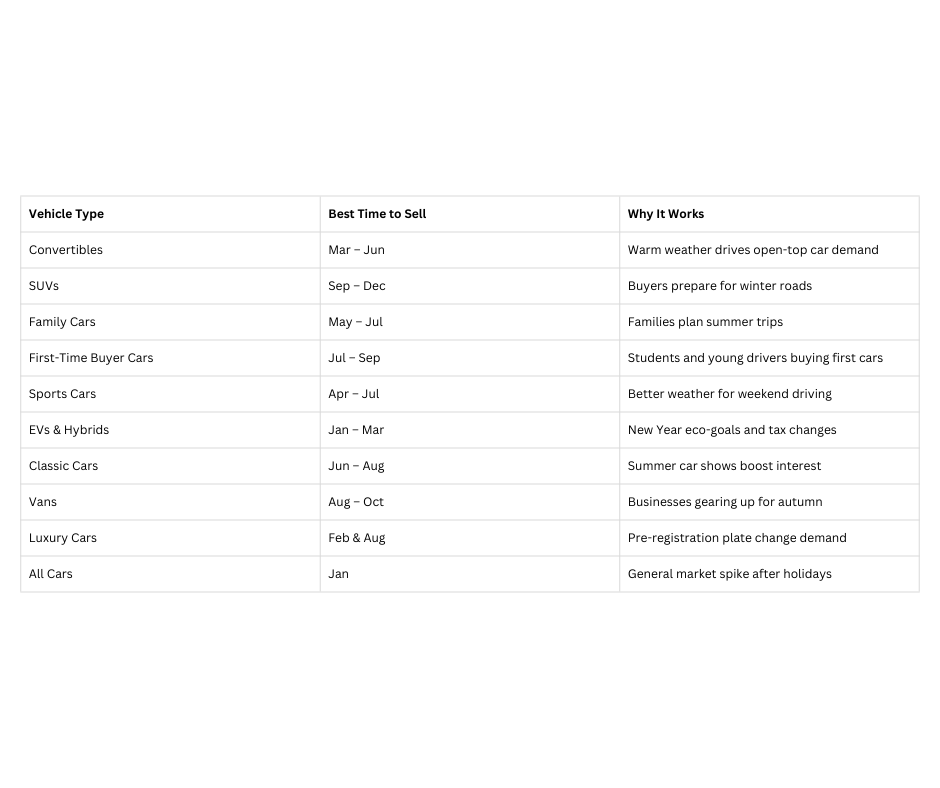Top 10 Seasonal Trends in the UK Car Market: When to Sell for the Best Price
13/08/2025car trends, Sell my car, UK Car Market, uk seasonal car trends
Timing is everything when it comes to selling your car. In the UK, demand and prices for certain vehicle types rise and fall with the seasons. By understanding these trends, you can choose the right time to sell and maximise your payout.
Whether you own a convertible, an SUV, or a family hatchback, the market has its peak periods — and missing them could cost you hundreds, if not thousands, of pounds.
Here are the top 10 seasonal trends you should know before you list your car.

1. Convertibles in Spring & Early Summer
When the sun comes out, so does the demand for drop-tops. From April to June, buyers are actively searching for convertibles to enjoy the warmer weather.
Best Time to Sell: Late March to early June.
Pro Tip: A professional valet and roof check can add extra appeal.
2. SUVs in Autumn & Winter
4x4s, crossovers, and larger SUVs see a spike in demand from October onwards, as buyers prepare for wet and icy roads.
Best Time to Sell: September to December.
Pro Tip: Emphasise features like all-wheel drive, heated seats, and winter tyres.
3. Family Cars Before School Holidays
MPVs and estate cars often sell faster in the lead-up to summer holidays as families plan road trips.
Best Time to Sell: May to July.
Pro Tip: Highlight boot space, fuel economy, and safety features.
4. First-Time Buyer Cars in Summer
Small, affordable cars surge in popularity after A-level results and during university intake periods.
Best Time to Sell: July to September.
Pro Tip: Mention low insurance group ratings and fuel efficiency.
5. Sports Cars in Spring
Performance cars benefit from better weather and longer daylight hours for weekend drives.
Best Time to Sell: April to July.
Pro Tip: Showcase service history and any premium upgrades.
6. Electric & Hybrid Vehicles in January
January sees an uptick in EV and hybrid sales as buyers act on New Year’s resolutions to be more eco-friendly — plus, new UK tax rules often come into effect in April.
Best Time to Sell: January to March.
Pro Tip: Emphasise charging range, battery health, and running cost savings.
7. Classic Cars During Summer Shows
The UK’s classic car scene peaks during the summer show season. Enthusiasts are more likely to buy after being inspired at events.
Best Time to Sell: June to August.
Pro Tip: Provide detailed restoration history and plenty of high-quality images.
8. Vans in Early Autumn
Tradespeople and small business owners often upgrade or expand their fleet after summer holidays, ahead of a busy autumn.
Best Time to Sell: August to October.
Pro Tip: Highlight MOT length, service records, and payload capacity.
9. Luxury Cars Before New Plate Releases
High-end cars see a boost in sales just before new registration plates come out in March and September, as buyers look for nearly-new deals.
Best Time to Sell: February and August.
Pro Tip: Market it as a cost-effective alternative to a brand-new purchase.
10. All Cars in January
January is one of the busiest months for the used car market overall — many people get bonuses or start new jobs and want to upgrade.
Best Time to Sell: Early January.
Pro Tip: Beat the rush by advertising before the first week ends.
Summary Table: Seasonal Selling Guide

Final Tip: Timing Is Key, But So Is Presentation
While seasonal demand can boost your selling price, presentation, advertising reach, and negotiation skills matter just as much.
At PCBS, we make selling easy — handling valuations, marketing, and buyers so you get the best price, no matter the season.
How We Help at PCBS
At Premium Car Buying Service, we specialise in evaluating prestige and performance vehicles — and we understand the value a remaining warranty adds.
When you sell to us:
✔️ We offer personalised, manual valuations — no bots, no auto quotes.
✔️ We factor in your remaining warranty for better offers.
✔️ We collect your car from home and pay you directly — no middlemen.
